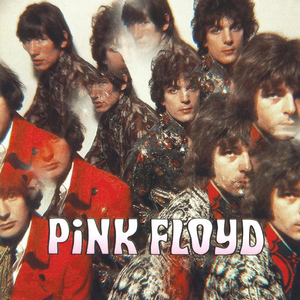Every Pink Floyd fan has his favourite era of the band’s music. For the casual listener, the obvious essentials are Dark Side of the Moon and Wish You Were Here. These are indisputably great albums — masterpieces in their own right — but I’ve always had a soft spot in my heart for The Piper at the Gates of Dawn.
Usually I don’t go into first-person narratives with my reviews, but it seems appropriate to do so here. I wasn’t exactly a big music buff until my mid-teens; around the age of 15 or so, for whatever reason, I suddenly gained a huge interest in music, and hungrily devoured a lot of classic rock in my effort to self-educate myself, since I hadn’t grown up in a household that embraced popular music. Somewhere along the way I struck Pink Floyd and Dark Side became an object of regular rotation.
And then someone, somewhere, mentioned Syd Barrett to me, and I delved into Piper on a whim. To my surprise, I became somewhat enamored with not only the album, but Barrett himself. As is the case for many of his fans, something about his enigmatic personality only made the music more appealing. He was still alive at this time, and I found it fascinating that an artist could produce such a masterful work and then, for all practical purposes, drop off the face of the earth and live in relative obscurity, only to be photographed on rare occasion during daily trips to the candy store (a diabetic, he reportedly became quite addicted to sweets in his old age).
I like to think, too, in an admittedly sad way, that I related to his alienation and introspective nature that had been translated through his music. I was at a transitory period in my life, that awkward stage between adolescence and adulthood; much as many teenage boys find connections with Cobain and Morrison, I could relate to Barrett. And, as also with Cobain and Morrison, the tragedy of Barrett’s personal life seemed to only enrich his music over the years. Cruelly, the level of cult attention he now receives may have been enough to lift him out of whatever state he was in. Instead, he slowly lost his mind, lost in a haze of psychedelic drugs and depression, perhaps even schizophrenia.
All of this having been said, The Piper at the Gates of Dawn is unlike any other Pink Floyd album, and yet showcases some of the group’s best work. The psychedelia of tracks like “Take Up Thy Stethoscope and Walk” may sound somewhat dated, but the songs as a whole still hold up brilliantly. “Lucifer Sam” has one of the best riffs of all time, playful and fun with an impossibly catchy, abrupt chorus.
For those who are more accustomed to the band’s later works like Dark Side and never delved into their early material, Piper is essential listening. The Barrett era of Pink Floyd and hear a very different band, lost in a haze of psychedelia and acid trips but still firing on all cylinders.

